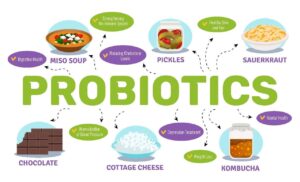In recent years, people have become more aware of the intricate relationship between gut health and mental well-being. Researchers suggest that serotonin and probiotics have an important role to play in your mental well-being. Serotonin is a neurotransmitter that plays a role in regulating mood where as probiotics has beneficial bacteria that support gut health. This article explores the fascinating connection between serotonin and probiotics, as well as how they may influence your mood.

What is Serotonin?
Serotonin is often referred to as the “feel-good” neurotransmitter. It is crucial in regulating mood, emotions, and overall mental health. While it’s commonly associated with happiness and well-being, serotonin also affects sleep, appetite, and digestion. Remarkably, about 90% of the body’s serotonin is produced in the gastrointestinal (GI) tract, emphasizing the gut’s importance in mood regulation.
What Are Probiotics?
Probiotics are live microorganisms responsible for a healthy gut. These microorganisms provide health benefits when taken in sufficient quantities. Probiotics are not only responsible for a balanced gut microbiome but also enhance digestion and strengthen the immune system. They have the potential to affect your mood. Common strains of probiotics include Lactobacillus and Bifidobacterium, typically found in fermented foods such as yogurt, kefir, sauerkraut, and kimchi. Some easily available Indian Probiotic foods are: curd, buttermilk, paneer, raw cheese, fermented foods like idli and dosa, green peas, whole wheat bread, etc.
The Gut-Brain Axis ( The Connection Between your Gut and your Mood )
The gut-brain axis is a sophisticated communication network linking the gut and brain. This connection utilizes various pathways, including hormonal signals, the nervous system, and immune responses. Research indicates that a well-functioning gut can enhance mood and overall mental health. Disruptions in gut microbiota have been correlated with conditions such as anxiety and depression, emphasizing the crucial role of gut health in emotional stability. This means a happy gut can give a happy mood.
Serotonin and Probiotics ( The Connection)
1. Enhancing Gut Health
Probiotics can help restore the balance of beneficial bacteria in the gut. A healthy microbiome is essential for optimal serotonin production. A balanced gut microbiome can enhance the gut’s ability to produce serotonin, potentially leading to improved mood and reduced symptoms of anxiety and depression.
2. Reducing Inflammation
Chronic inflammation in the gut can negatively impact serotonin levels. Probiotics help reduce inflammation and promote a healthy gut lining, creating an environment that supports serotonin production.
3. Influencing the Production of Neurotransmitters
Some studies suggest that specific probiotic strains can directly influence the synthesis of neurotransmitters, including serotonin. By modulating the gut microbiome, probiotics may enhance serotonin levels, contributing to better emotional health.
4. Impact on the Stress Response
Probiotics may help regulate the body’s response to stress, which can impact serotonin levels. Probiotics may indirectly support healthier serotonin levels by reducing anxiety and promoting relaxation, It can also help by fostering improved mood and emotional resilience.
Research Findings of Connection Between Serotonin and Probiotics
Several studies have explored the connection between probiotics and mental health. A review published in the journal Nutrients found that probiotics could help reduce symptoms of anxiety and depression, possibly through their effects on serotonin metabolism. Additionally, a clinical trial demonstrated that participants taking probiotics experienced a significant reduction in anxiety levels compared to those who received a placebo.
How to Incorporate Probiotics into Your Diet
If you’re interested in enhancing your gut health and potentially improving your mood, consider incorporating probiotics into your diet:
- Fermented Foods: Include foods like yogurt, dosa, Idli, dhokla, kefir, sauerkraut, kimchi, and miso, which are rich in beneficial probiotics.
- Probiotic Supplements: These can be an effective way to increase your intake of specific probiotic strains. Consult a healthcare professional to find the right supplement for you.
- Prebiotic Foods: Foods rich in fiber, such as fruits, vegetables, and whole grains, can support the growth of beneficial gut bacteria, working synergistically with probiotics.
End Note
The connection between serotonin and probiotics, as well as the gut health underscores the importance of a holistic approach to mental well-being. By nurturing your gut through a balanced diet rich in probiotics, you may positively influence your mood and overall mental health. As research continues to unveil the complexities of the gut-brain axis, the role of serotonin and probiotics in enhancing emotional well-being remains an exciting area of exploration. Consider making gut health a priority, and you may find it benefits not just your digestion, but also your mood and mental clarity.




